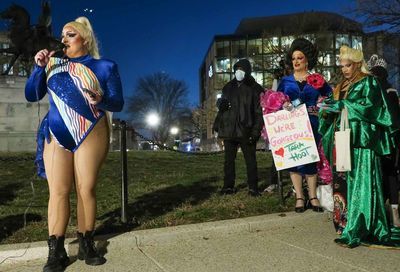Nancy Pelosi Will Not Seek Leadership Post Come January 2023
The longtime Democratic House Speaker will remain as a member of the House of Representatives in the next Congress.

Nancy Pelosi, the first female speaker of the House of Representatives and the Democrats’ top leader for the bulk of the tumultuous first two decades of the 21st century, announced on Thursday that, come January, she will step down from her role within the Democratic caucus.
“With great confidence in our caucus, I will not seek re-election to Democratic leadership in the next Congress,” Pelosi said in a speech on the House floor.
Pelosi, who served as Speaker from 2007 to 2011, and then House Minority Leader until winning back the speakership in 2019, has served as the Democratic party’s longest-serving leader since Sam Rayburn of Texas, who died in 1961 after presiding over his party’s caucus for 25 years.
The 82-year-old San Francisco Democrat and longtime LGBTQ ally announced her decision shortly after election returns from Western states made it clear that Republicans had flipped control of the House in last week’s midterm elections.
She will continue to serve in the next Congress, but will take on more of an advisory role to whoever assumes control of the often-rowdy and hard-to-control Democratic caucus — something Pelosi did deftly during her time as speaker, making sure she had enough votes to pass key legislation, even if by the slimmest of margins.
At times when Democrats enjoyed robust margins, Pelosi knew how many conservative Democrats to allow to break ranks in order to aid their re-election chances without sacrificing the overall fate of a particular bill. She exercised strict discipline over the historically fractious Democratic caucus, balancing the competing interests of more progressive members and their more moderate or corporate-friendly counterparts.
Pelosi’s decision comes just weeks after her husband of 60 years, Paul Pelosi, survived an assault from a hammer-wielding conspiracy theorist who broke into the family’s home in San Francisco with the intent of torturing and assaulting Pelosi herself.
As noted by NBC News, Pelosi was a central player in passing some of the most significant laws in history, ranging from President George W. Bush’s Wall Street bailout at the height of the 2008 financial crisis; the passage of former President Barack Obama’s signature legislation, the Affordable Care Act; former President Donald Trump’s COVID-19 rescue programs; and infrastructure and climate change bills prioritized by the Biden administration.
Pelosi’s departure from leadership also creates a long-awaited power vacuum on the Democratic side of the aisle.
For years, Pelosi, along with House Majority Leader Steny Hoyer (D-Md.) and House Majority Whip James Clyburn (D-S.C.) — all of whom are in their 80s — have presided over the Democratic caucus for nearly two decades, sparking complaints from younger Democrats who claimed there were few opportunities for advancement within the party ranks.
Pelosi’s national profile as a San Francisco liberal and a political insider also earned her a substantial amount of hate from her opponents on both the left and the right, and at times, moderate Democrats complained that she served as more of an albatross for those in tight re-election races.
Just prior to this year’s midterm elections, two of her fiercest critics — Reps. Elissa Slotkin (Mich.) and Abigail Spanberger (Va.), who both represent swing districts — called for a new generation of leadership to take over the party.
It remains unclear who will take over the reins from Pelosi once Democrats return as the minority party — albeit by a slim margin — in January.
Rep. Hakeem Jeffries (D-N.Y.), 52, has long been considered Pelosi’s heir apparent and was recently endorsed by Hoyer, Pelosi’s second-in-command, who announced he also would not seek a leadership position in the next Congress, reports Reuters.
However, Clyburn, the current Democratic Whip, indicated that he had no intention of stepping down from leadership, raising speculation as to whether he’d make a bid for the Democrats’ top spot himself, or whether he’d simply stay on in another position in some sort of “advisory” role.
According to Reuters, Rep. Katherine Clark (D-Mass.), 59, is expected to run for the post of Minority Whip. Rep. Pete Aguilar (D-Calif.), an ally of Jeffries and Clark, is also expected to rise in the ranks, and could take over Jeffries’ current position as chairman of the caucus.
Support Metro Weekly’s Journalism
These are challenging times for news organizations. And yet it’s crucial we stay active and provide vital resources and information to both our local readers and the world. So won’t you please take a moment and consider supporting Metro Weekly with a membership? For as little as $5 a month, you can help ensure Metro Weekly magazine and MetroWeekly.com remain free, viable resources as we provide the best, most diverse, culturally-resonant LGBTQ coverage in both the D.C. region and around the world. Memberships come with exclusive perks and discounts, your own personal digital delivery of each week’s magazine (and an archive), access to our Member's Lounge when it launches this fall, and exclusive members-only items like Metro Weekly Membership Mugs and Tote Bags! Check out all our membership levels here and please join us today!






















You must be logged in to post a comment.